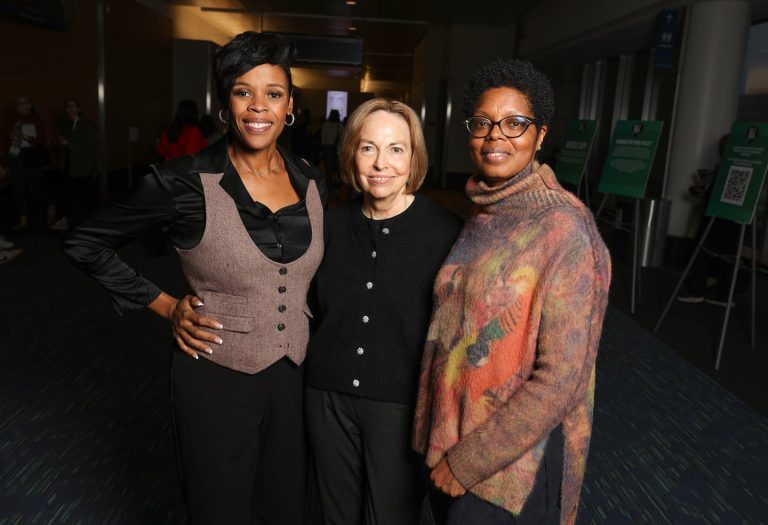“You can look in the rearview mirror and say, ‘Lessons learned,’ but the important thing is what you are going to do moving forward,” said Gloria Larson, the MCCA’s outgoing interim executive director. “BECMA could have an influential role with great knowledge and expertise to help us be the absolute best we could possibly be.”
Larson replaced former executive director David Gibbons at a time when the MCCA was grappling with growing criticism of racial discrimination. Marcel Vernon Sr., chief financial officer of Bay Cove Health Services, assumed Larson’s role earlier this week.
BECMA is not a new dance partner, Larson said. It has advocated for more inclusive vendor contracts at the authority since its inception and offered its expertise in addressing the MCCA’s supplier diversity goals earlier this year.
Larson said the consulting agreement could also help the agency get past its reputation for discrimination that has loomed large in recent years, which she called the “elephant in the room.”
In early 2023, five employees filed a complaint with the state attorney general’s office, accusing the agency of racial discrimination in its working environment, hiring practices, and security of Black-centered events under Gibbons’s leadership. The MCCA followed up with a 112-page commissioned study of its internal practices that found that few Black and Latino employees made up its leadership team and the agency had ticked off the state’s supplier diversity requirements but did little beyond that. A state audit published in August reached similar conclusions.
Months after the Globe’s report on the employees’ complaint, the MCCA hired a chief diversity officer. Governor Maura Healey also appointed seven members to the agency’s board, which made the overseeing body more diverse.
Larson hopes this week’s announcement could build on these changes.
In the future, she hopes the MCCA’s move can offer a roadmap for other organizations hoping to hire more diverse vendors. She hopes the agency can “look from the sidelines,” cheering on similar institutions that are considering exploring similar partnerships.
On paper, the agency is making progress. For fiscal year 2024, which ended in June, the MCCA put roughly a fourth of its $56.5 million discretionary budget toward minority, women, and veteran-owned businesses. More than 12 percent of the funding went toward businesses where people of color made up the majority of ownership and was $2.5 million higher than its original goal.
In some regards, MCAA didn’t meet its goals. The agency spent $1.6 million less than its benchmark on women-owned businesses, and roughly 4.5 percent of its $1.7 million goal for veteran-owned firms.
BECMA president Nicole Obi said the council’s work will go beyond identifying a more diverse set of firms for MCCA to do business with. It will help these minority business enterprises form competitive bids and scale their operations so that hiring small, homegrown businesses to meet large buyer needs becomes more commonplace.
“That will help not just those firms, not just the Black community, but the Massachusetts economy overall,” Obi said.
The duo’s buildup toward a more diverse business portfolio has been gradual thus far, relying on a recommendation here or a plug there. MCCA’s review of its practices has unearthed small ways that vendor requirements have shut smaller, less-resourced businesses from lucrative deals. For example, in the months leading up to the yearlong contract, BECMA and MCCA had been in talks to make an event planning agreement with RoseMark Production, a Dorchester-based event firm.
Rose Staram, RoseMark Production’s founder and owner, said her company had scored contracts for Attorney General Andrea Campbell’s inauguration celebration, the 2023 NAACP Convention, and BECMA as event planners on MCCA’s properties. She hadn’t signed a contract with the MCCA, because she would have to pay an extra $40,000 in insurance to meet the agency’s coverage requirement.
“We are small, we are minority women, so every dollar does matter,” Staram said.
MCCA looked at its policies and decided to self-insure instead, meaning Staram wouldn’t have to pay more to meet the liability requirement. In October, Staram became the MCCA’s first minority woman general services contractor for event planning, meaning that she can oversee any events at the agency herself.
“We’ve had a lot of opportunities to become a real powerhouse, but here where I was born and bred, I felt like I couldn’t break through,” Staram said. With this deal, it “was like, ‘Yes! We’re breaking through.”
Obi said that consulting agreements like theirs can’t exist in a vacuum and will need to be coupled with efforts to address other barriers that small vendors face, like accessing capital or securing bank loans.
“They’re there to provide contracts, they’re not there to provide capital,” Obi said. “But it is important for them to understand the circumstances that many of these businesses are operating under.”
Staram acknowledged that bringing more small, minority-owned businesses like hers into the MCCA’s operations will take more than relationship building. Both public and private entities, she said, need to “hit the go button” and fund more policies and organizations that give entrepreneurs the financial literacy to scale up toward large buyers.
This story was produced by the Globe’s Money, Power, Inequality team, which covers the racial wealth gap in Greater Boston. You can sign up for the newsletter here.
Tiana Woodard can be reached at tiana.woodard@globe.com. Follow her @tianarochon.





